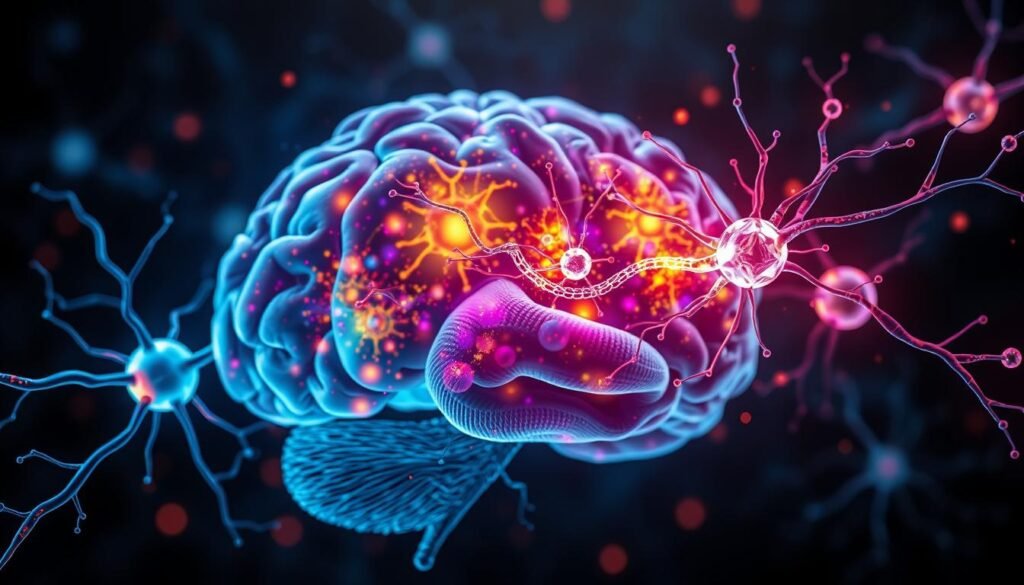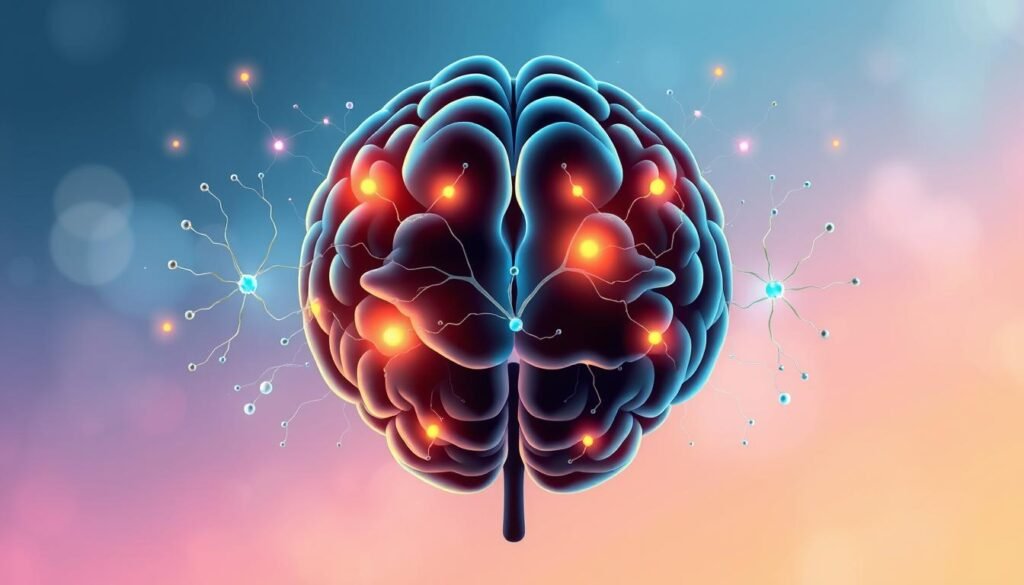About 31.1% of U.S. adults will face an anxiety disorder at some time. This calls for effective treatments, like Abilify. In this guide, we’ll examine how Abilify helps with anxiety. It’s known for treating schizophrenia and bipolar disorder but works for anxiety too. We’ll look into how it functions, its effectiveness, recommended doses, possible side effects, and user experiences.
Learning how Abilify treats anxiety helps people make better health choices. If you or a loved one is thinking about anxiety medication, this guide offers valuable insights. It will let you know what to expect from Abilify.
Key Takeaways
- Abilify is an atypical antipsychotic used in treating mental health conditions.
- It is FDA-approved for several disorders, including schizophrenia and bipolar disorder.
- Abilify can also be prescribed off-label for anxiety treatment.
- Regular monitoring by healthcare providers is essential for effective anxiety management.
- Common side effects may include nausea and headaches, but serious risks exist.
Understanding Abilify and Its Uses
Abilify, also known as aripiprazole, is a type of atypical antipsychotic medication. It’s mainly used to treat severe mental health problems. It’s effective for a range of psychiatric disorders, making it highly valuable in mental health care.
What is Abilify?
Aripiprazole works by partially activating dopamine D2 and serotonin 5-HT1A receptors in the brain. This action helps keep neurotransmitters that affect mood and thought in balance. It’s especially useful for managing schizophrenia, bipolar disorder, and major depressive disorder, among others. It also tackles a variety of emotional and behavioral issues.
FDA-approved Uses of Abilify
Aripiprazole has received FDA approval for treating specific mental health issues. The main conditions approved include:
- Schizophrenia
- Bipolar I disorder
- Major depressive disorder (as an adjunct treatment)
- Autism spectrum disorder
- Tourette disorder
This FDA approval highlights its importance in enhancing life quality for patients. It’s often prescribed alone or with other meds for the best results.
Off-label Use for Anxiety
Aripiprazole is also prescribed off-label for anxiety, despite mixed study results. Dosages vary depending on factors like age and health. The starting dose is usually low, then gradually increased to find what’s most effective.
The medication comes in tablets, disintegrating tablets, and oral solutions. This makes treatment more flexible. It’s crucial for healthcare providers to monitor patients closely when aripiprazole is used for anxiety.
The Mechanism of Action of Abilify
Understanding how Abilify works is key to seeing its benefits for mental health problems like anxiety. It is known by its generic name, aripiprazole. It helps manage the brain’s neurotransmitters. It does this by working on dopamine and serotonin receptors.
Dopamine Receptor Modulation
Abilify is unique as it targets dopamine D2 receptors in a specific way. It helps keep dopamine levels balanced. This balance can ease symptoms of anxiety and depression. It also avoids the side effects that stronger medications might cause.
Serotonin Receptor Modulation
Abilify also affects serotonin receptors, hitting 5-HT1A and 5-HT2C spots. This helps even out serotonin, which is vital for feeling stable and less anxious. By acting on both types of receptors, Abilify makes anxiety treatments more effective.

How Abilify Works in Treating Anxiety
Abilify is becoming more popular for its role in easing anxiety disorders. It’s important to note that it’s not specifically FDA-approved for anxiety. The way Abilify helps with anxiety symptoms is by balancing brain chemicals. This shows why it’s effective for people struggling with anxiety.
Reducing Anxiety Symptoms
People looking for help with anxiety disorders like GAD, panic disorder, and OCD may find Abilify useful. When used alongside psychotherapy, Abilify can be effective. It has helped those who didn’t benefit from other anti-anxiety meds.
Impact on Neurotransmitters
Understanding Abilify’s effect on neurotransmitters is key. It helps maintain dopamine and serotonin levels, which are vital for mood and anxiety management. Stable neurotransmitter levels improve brain function and emotional stability. This decrease in anxiety feelings shows Abilify’s positive impact.

| Neurotransmitter | Role in Anxiety | Effect of Abilify |
|---|---|---|
| Dopamine | Affects pleasure, motivation, and attention | Regulates levels to improve mood and manage anxiety |
| Serotonin | Regulates mood, anxiety, and happiness | Stabilizes levels to reduce anxiety symptoms |
In conclusion, Abilify’s key to reducing anxiety lies in its neurotransmitter effects. By balancing brain chemicals, it helps lessen anxiety and supports mental health.
Efficacy of Abilify in Treating Anxiety Disorders
Abilify, or aripiprazole, has been making waves in anxiety disorder treatment. Its effects have been compared to other common anxiety medications through various studies. This attention is due to its promising outcomes in significant research.
Research Findings
Studies show Abilify might be good at managing anxiety symptoms. It could help with bipolar depression and major depressive disorder, researchers say. The hope is that it might also work well for treating anxiety.
Although it’s mainly used for mood disorders, scientists are still learning about its wider effects. They aim to fully understand how it works for various mental health issues.
Comparison with Other Medications
Understanding how Abilify stacks up against other meds is key. Compared to similar drugs, aripiprazole often has fewer side effects. This makes it a better option for some people.
In youth studies, Abilify improved symptoms of schizophrenia and bipolar disorder significantly better than no treatment. It compared well against a placebo.

Abilify seems to have a bright future in anxiety treatment. More research is on the way to confirm its benefits. Ongoing comparisons will clarify its role among current treatments. For in-depth info on antipsychotic medicines, check this resource.
Dosage and Administration of Abilify
The right dosage of Abilify changes based on the patient’s condition and factors. Healthcare providers must assess and monitor patients closely. They tailor the recommended dosage for anxiety to meet patient needs. Knowing how to correctly give aripiprazole ensures the best treatment results.
Recommended Dosage for Anxiety
For adults, the starting dose often ranges from 10 mg to 15 mg daily. This is for treating schizophrenia or major depression. Kids and teens may start at 2 mg to 5 mg. They can then increase to a dose of up to 30 mg depending on how they respond. A healthcare professional should always set the recommended dosage for anxiety.
How to Take Abilify
Abilify comes in oral tablets, dissolving tablets, and liquid forms. Tablets can be taken with or without eating, but liquid must be measured accurately. Injections are given once a month. Keep taking your medicine even if you feel better. Talk to your doctor before changing your regime. Take a missed dose as soon as you remember, unless it’s almost time for the next one. Then, skip the missed dose.
Seeing your doctor regularly to check your progress and adjust doses is key.
| Condition | Starting Dosage | Maintenance Dosage |
|---|---|---|
| Adults with Schizophrenia | 10-15 mg/day | 15 mg/day |
| Children (Bipolar Disorder) | 2 mg (initial), increased to 5 mg, then 10 mg/day | 10 mg/day (max 30 mg) |
| Children (Autism Spectrum Disorder) | 2 mg/day, increased to 5 mg | 10-15 mg/day (max 15 mg) |
| Adults with Major Depressive Disorder | 2-15 mg/day | Up to 15 mg/day |
For more information on using Abilify safely, check this detailed overview.
Abilify Side Effects and Considerations
Understanding Abilify’s potential side effects is key for anyone thinking about this medication. It’s beneficial for many, but knowing both mild and serious side effects is wise. This knowledge aids in making smart choices about treatment.
Mild Side Effects
Some common, manageable side effects of aripiprazole exist. These may include:
- Nausea
- Headache
- Dizziness
- Sleepiness
- Blurred vision
- Vomiting
- Constipation
- Increased appetite leading to weight gain
These symptoms are usually not serious health risks. If they become troublesome or linger, talking to a doctor is a good step.
Serious Side Effects
Rarely, Abilify might cause serious side effects. Some of these include:
- Neuroleptic malignant syndrome
- Extrapyramidal symptoms, including akathisia
- Tardive dyskinesia
- Suicidal thoughts and behaviors in those under 24
- Severe allergic reactions
- Metabolic changes leading to diabetes and high cholesterol
- Body temperature control issues
- Orthostatic hypotension
Older adults should watch out for certain severe side effects like seizures and drowsiness. Pregnant women need to know about risks to newborns like muscle stiffness or feeding issues.
Abilify may raise the chance of heat-related illnesses by affecting sweating. It’s best to stay cool and avoid overheating.
Talking openly with healthcare providers about any side effects is critical. Working closely with them ensures Abilify’s use is both safe and effective.
Consulting with Healthcare Professionals
When thinking about how to treat anxiety disorders, talking with healthcare experts is key. They help patients get treatment plans that fit just right. Knowing how Abilify works, its side effects, and its impact is part of this.
Importance of Medical Guidance
For patients considering Abilify, working closely with healthcare pros is a must. This teamwork leads to:
- Individualized Treatment Plans: Tailoring dosages based on the patient’s response and needs.
- Comprehensive Evaluations: Checking for side effects to fine-tune treatment.
- Informed Dosage Adjustments: Changing medications as needed after check-ups.
Monitoring Treatment Efficacy
Keeping an eye on how well Abilify works is crucial. Regular meetings with healthcare teams help evaluate the medication’s effectiveness. Patients can look forward to:
- Regular Progress Reviews: Tracking changes in anxiety and well-being.
- Side Effect Management: Quickly handling any adverse reactions for safety and comfort.
- Ongoing Support: Getting constant advice assists in choosing the right treatment moves.
This close teamwork can improve anxiety treatment outcomes. It leads to better mental health and a higher quality of life.
Patient Experiences and Anecdotes
People have shared their stories about using Abilify for anxiety. These stories show different results from taking the medicine. They reveal the good and tough times people have had, making us see how Abilify affects mental health.
Success Stories
Some people feel a lot better after using Abilify for anxiety. They talk about feeling more like themselves and less worried. This change helps them do everyday tasks better and enjoy life more. People often say Abilify helps them feel in control of their mental health again.
Challenges and Adjustments
But, not all experiences are smooth. Some face side effects like nausea or feeling dizzy. They have to work with doctors to fix these problems. Finding the right dose is key. This shows Abilify helps many, but it’s not right for everyone. Hearing these stories is vital for anyone thinking about trying Abilify.
| Category | Success Stories | Challenges of Using Abilify |
|---|---|---|
| Symptom Relief | Significant reduction in anxiety | Nausea and dizziness |
| Quality of Life | Improved daily functioning | Adjustment of dosages needed |
| Overall Sentiment | Reclaiming normalcy | Managing side effects |
Conclusion
Abilify plays a critical role in managing psychiatric conditions. These include schizophrenia, bipolar disorder, and depression. It’s also being noticed for anxiety treatment off-label. Though research outcomes vary, evidence suggests Abilify can reduce anxiety symptoms effectively, especially with antidepressants.
Its action is through dopamine and serotonin regulation, aiding its effects. Abilify’s dosage and use depend on the person’s age, health, and symptom severity. Starting with a low dose and slowly increasing can improve results, helping patients get the best benefits.
When thinking about using Abilify for anxiety, consulting healthcare experts is crucial. Regular check-ups and professional advice ensure the treatment’s success. Abilify might be key in a broader mental health strategy that includes drugs and therapy for the finest wellbeing.